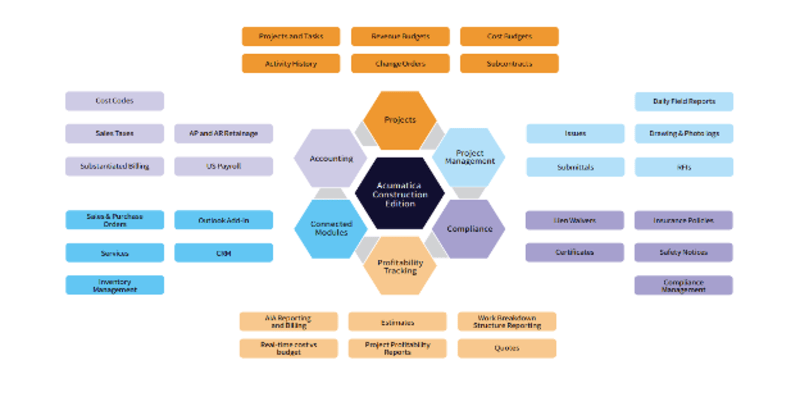Today, businesses in the construction industry need more than basic accounting software to manage operations. Contractors face ever-changing regulations, compliance issues, and increasingly complex projects.
Many companies still rely on low-end solutions like QuickBooks, often combined with industry-specific add-ons. While these systems get the job done for smaller firms, they lay an unstable foundation for future growth. Managing bids, project costs, subcontractors, and compliance with these tools becomes increasingly difficult as volume and complexity increases, leading to inefficient workflows, error-prone manual workarounds, and data siloes that prevent you from getting a “big picture” view of your business.
As construction companies expand, they face new challenges that low-end solutions can’t handle. Limited-scope ERPs may improve some functions, but they often lack the flexibility and scalability needed for long-term growth. These systems tend to focus on specific problems without offering a comprehensive solution for the company as a whole.
A modern ERP system provides a holistic approach, integrating all aspects of the business. From project management to payroll, a well-designed ERP can help construction companies streamline operations, improve efficiency, and ultimately enhance profitability. This article will guide you through the key considerations for choosing the right ERP for your construction company.
Different Contractors Need Different Functionality
Not all construction companies are the same, and neither are their needs when it comes to ERP systems. Depending on the type of contractor, whether general contractors or subcontractors, each business requires specific features from their ERP to address their unique challenges. General contractors, for example, handle larger, more diverse projects and may need robust project management tools. They need to track everything from bids to final payments while coordinating between multiple subcontractors.
Subcontractors, on the other hand, typically focus on specialized areas like electrical work, plumbing, or HVAC. Their ERP needs are different because their project scope is narrower. For them, equipment management, scheduling, and compliance with industry standards are often the top priorities.
Additionally, the type of construction projects can also affect ERP requirements. Residential, commercial, industrial, and civil construction each present their own sets of challenges. Residential builders may need detailed payroll tracking for compliance with government regulations, while civil construction contractors working on large infrastructure projects might prioritize project management and safety compliance features.
It’s essential to recognize that an ERP solution should align with your specific business model and project types. You should consider, not just the functionality you need today, but what you might need as you scale your business. Choosing a solution based on legacy technology, or one with limited ability to integrate your other applications, can ultimately limit your business’s growth potential.
Acumatica Covers All the Bases for Construction
Acumatica Construction Edition is a cloud-based ERP solution specifically designed to meet the needs of all types of contractors. Whether you are a general contractor, a subcontractor, or involved in civil or industrial construction, Acumatica offers a wide range of features tailored to your specific industry needs.
For general contractors, Acumatica provides tools to manage every aspect of the business, from project costing to compliance and payroll. The platform’s real-time data access enables project managers to track budgets, labor, and materials all in one place, ensuring projects stay on schedule and within budget.

Subcontractors benefit from Acumatica’s specialized features such as equipment management, contract tracking, and field service management. These features make it easy to handle day-to-day operations and ensure compliance with industry regulations.
For companies involved in more specialized sectors like civil and industrial construction, Acumatica offers advanced project management features. These include the ability to access and share critical documents in real time, ensuring everyone on the team is up-to-date on the latest project changes and safety requirements.
Acumatica’s cloud-based architecture allows for remote access, ensuring that both field and office teams can collaborate seamlessly. This integration of tools and data allows construction companies to operate more efficiently and stay competitive in today’s market.

Choose an ERP Partner with Construction Industry Expertise
Selecting the right ERP software is only part of the equation. Equally important is choosing an implementation partner who understands the unique challenges of the construction industry. Working with a partner who has in-depth experience with construction ERP solutions can make all the difference in getting the most out of your system.
An expert partner will help customize the ERP to fit your specific needs, ensuring that it supports your business processes from day one. They will also provide ongoing support and training to make sure your team can fully leverage the system’s capabilities.
Gale Force Consulting is a trusted name in the construction industry, with years of experience helping businesses implement ERP solutions like Acumatica. Our team of experts understands the unique challenges construction companies face and can tailor the ERP to fit your specific needs.
If you’re ready to take the next step toward improving your construction company’s efficiency and profitability, contact us today.
We’ll be glad to help you build a foundation for business growth.



